Political Cigar Boxes
A National Cigar History Museum Exclusive
© 2013 Tony Hyman, all rights reserved
Latest addition: January 20, 2011
Enhanced: March 17, 2011
Box added: May 8, 2013

Political Cigar Boxes
A National Cigar History Museum Exclusive
© 2013 Tony Hyman, all rights reserved
Latest addition: January 20, 2011
Enhanced: March 17, 2011
Box added: May 8, 2013
Anyone who watches television can see that modern election campaigns have degenerated into a series of evasive statements, vague promises, and mudslinging commercials. It’s difficult for today’s voters to comprehend that nineteenth-century elections were events filled with passion and intellectual debate, with the citizenry adequately informed and taking sides in public forums — not sanitized town meetings with pre-approved questions asked of carefully groomed candidates. A century ago, elections were grand public affairs — band concerts, parades, handbills, posters, banners, saloon arguments, a ham from the ward heeler, and cigars. Always cigars. From the smoke-filled rooms of Tammany Hall to the muddy, unpaved streets of rural America, cigars were part of every political confrontation.
The first cigar smoking President appears to have been Zachary Taylor, elected in 1848 before cigars had totally taken hold of American society. Taylor had become famous as a result of his exploits in the war with Mexico, a cigar-smoking country, home to a giant government run cigar factory with nearly 3,000 rollers. It’s not recorded, but quite likely, Mexico is where Taylor picked up the habit. Though not yet ubiquitous, cigars were surprisingly available, and not only in the major metropolitan centers. During the pre-Lincoln Presidencies of Fillmore, Pierce, and Buchanan, thousands of cigar factories were established in the U.S., mirroring and exceeding the boom taking place in Cuba. By 1860, there were already 350 cigar factories in far-Western California, twice that in Illinois and twice THAT in New York City. And the association between politics and cigars, though rudimentary, had begun.
FIVE TYPES OF POLITICAL BOXES:
• ISSUES: labels feature important issues of the day;
• YOUR CHOICE: offers choice between the candidates;
• GIVE-AWAYS: Given by the party to encourage vote;
• SUPPORT: cigar makers-retailers honor a candidate;
• NOT REALLY: former politicians, not campaigning.
1888 Grover Cleveland vrs. Benjamin Harrison
The game-box version features the four opposing candidates, but the awkward center-hinge design made it impossible to see them at once. Retailers had the option of displaying their favorite, or the
1886 Love and Scandal in the White House
Grover Cleveland may not have won the cigar war, but he won the fair damsel. Cleveland has the honor of being the only U.S. President to be married while in office. In 1886, during his first term, the 49 year old chief executive wed Frances Folsom, a young woman less than half his age. Marrying a 19, 21 or 22 year old (depending on which history you read) became a contributing factor, some believe, to Cleveland’s loss in the election of 1888. This box celebrating their union was filled with cigars by Powell & Goldstein, an Oneida, NY, company employing 100+ rollers.
[2203]
Blaine lost the election but won the cigar war
[11675] [7930] [2173]
1884 Grover Cleveland vrs. James G. Blaine
Once printing technology permitted, colorful patriotic themes dominated election boxes. [11819]
PEOPLE’S CHOICE proved to be a prophetic name with Cleveland sweeping the election. [2166]
The trade card depicts Blaine and his VP candidate John Logan, who says “We’ve got the nomination, but
to get elected we must keep the boys supplied with CAPADURAS,” then one of the nation’s biggest sellers.
Early reference by a major maker to cigars as bribes. [8938]
1880 James A. Garfield vrs. Winfield Scott Hancock
A plethora of third party candidates and a violently anti-Masonic movement tarnished the campaign, the Republican side of which hinged almost entirely on claims of Democratic corruption in big cities. When Garfield was shot, his VP Chester A. Arthur, a wealthy cigar smoking party boy took over.
[2165]
Garfield and his running mate, Chester A. Arthur, are featured inside this patriotically decorated box. The brand name atop the lid of the box, SURE THING, belies the notion this may have been one of a pair, the other featuring the Democratic candidates.
1880 Generic
One of the more unusual political boxes is this generic from the election of 1880. Cigars made by Jacob Schmitt in his 3 man factory located at 34 Division St. in NYC. One man has his back turned, the other hides under an umbrella.
[2162]
1876 Rutherford B. Hayes vrs. Samuel Tilden
This jewel of an Issues box depicts the two factions (rural Blacks and urban Irish) trying to push their candidate through a turnstile leading to the White House. Spikes atop the fence prevented either candidate from straddling the issues. Cigar boxes weren’t permitted to be manufactured of tin prior to 1870, making this box the oldest authenticated use of tin to pack cigars. The box is hand-soldered, plain, decorated only with paper liner and inner label.
The 1876 election between Republican Hayes, who strongly urged rights for Negroes, and Tilden, a hot tempered urban reformer who won the popular vote (by 250,000) was decided by Congressional Committee after Southern electoral votes appeared under suspicious circumstances. No surprise, a Congress controlled by Republicans awarded the Presidency to Hayes. In what has come to be called “the compromise of 1877” Hayes rewarded Southern states by with-drawing U.S. troops which had occupied the South since the Civil War, ending reconstruction. [2209]
1872 U.S. Grant vrs. Horace Greeley vrs. Victoria Woodhull
“Womens Rights” included the right to smoke in public, a hotly debated issue since Puritan days. The fashionable pretty cigar-smoking woman is rejecting “her” party and accepting gift cigars from the Democrats, while the hang-dog women’s party is attracting a different clientele. Ultimately, her choice didn’t matter, as both parties lost to the popular Grant. This is the earliest depiction of cigars being given away by a political campaign in exchange for attention and presumably votes. It is also a very early use of the women’s rights movement to sell a product.
Some of the earliest political boxes are issues boxes seeking to attract a smoker’s eye by depicting one of the day’s more newsworthy controversies. Any issues boxes are rare and a thrill to find.
The 1872 election pitted Republican Grant against Democratic newspaperman Horace Greeley, but the real attention-getters were the nominees of the newly formed Equal Rights Party: feminist Victoria Woodhull and abolitionist Frederick Douglass. Interestingly, Woodhull couldn’t have served had she been elected not because she was a woman, but because she didn’t meet the minimum age requirement of 35. [7594]
1868 Ulysses S. Grant vrs. Horatio Seymour
After the Civil War, it became the practice to create a brand of cigars to capitalize on a politician’s popularity or as a genuine personal statement of support. Boxes included a portrait and the candidate’s name but seldom party identification. The cigar maker’s name is usually prominent, more often than not emblazoned across the side or back of the liner. Willingness to be associated with the candidate suggests sincerity of the intended support, in contrast to the Your Choice style boxes, which never identify the cigar maker.
Heavy smoking wildly popular Civil War hero Ulysses S. Grant helped bring cigars into the mainstream. Grant became the only presidential candidate whose campaign song touted his love of cigars when “A-Smoking His Cigar” was introduced: “The people know just what they want. Less talk and no more war. For President, Ulysses Grant a-smoking his cigar.” [1401]
This Binghamton, NY, brand was created at least two years before Grant ran for the Presidency.
1860 or 1864 Abraham Lincoln: The first campaign label?
During the 1830’s, 40’s, and 50’s the Cubans experimented widely with shapes and sizes of labels to decorate the millions of boxes of cigars they were shipping worldwide. Many, like the Washington label designed for the top of a box, were early short-lived bad ideas. Others, like the three orators, were suitably designed for the end of a box of 100, but the placement of text above and below the image was quickly abandoned. By the 1860’s the most common form of cigar label was designed for the end of a box, vertical, with text above a square image below. Lithographic design and the absence of a beard tends to place this image before Lincoln became President, or very early in his term. In contrast to most Cuban labels, a maker and address are not given, but its discovery in a large European collection of Cuban cigar labels compiled 1838-1868 leads credence to that attribution. Was it originally ordered by a Lincoln supporter to help raise recognition or drum up votes? We’ll never know.
[1150]
The First Politicians on a Cigar Label
It’s logical to assume the revered former President, George Washington, was the first US President to be honored on a cigar box. If nothing else, he’s pictured on one of the earliest cigar boxes yet discovered, this Cuban box of 100 dating from around 1848.
The earliest living American politician known to have appeared on a cigar label was Henry Clay, who visited Cuba in 1850 and was honored with a long-lived cigar brand, possibly before he left the island.
Plagiarizing ideas was common among Cubans, one of whom who reasoned if one famous American orator’s name and picture could sell cigars, tres grandes politicos might sell even more.
More is known about life in ancient Abyssinia than about the cigar industry of Cuba and the U.S. before 1860. It would be safe to say we have more relics of the former than the latter, as well as more scholars devoted to learning about life thousands of years ago than we have dedicated to discovering the founda-tions of modern packaging and advertising. That can make it difficult to report too much with certainty. A lot of what can be written is conjecture and extrapolation based on very little physical data. That having been said...
The earliest political box is a “Not Really” since Washington wasn’t running for office in the 1840’s when it was used. The label featuring three active politicos honors their importance but probably had no campaign connection. [7423] [3720]
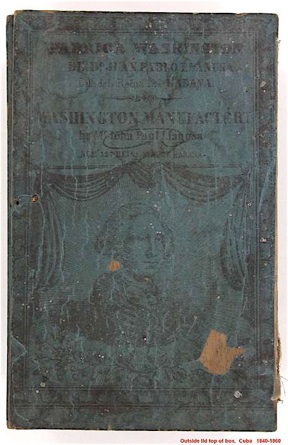
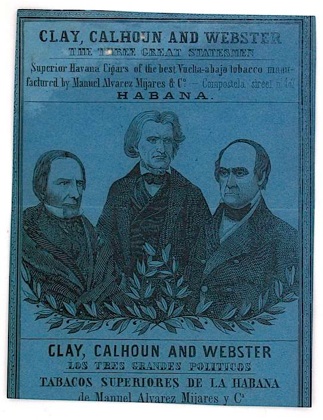
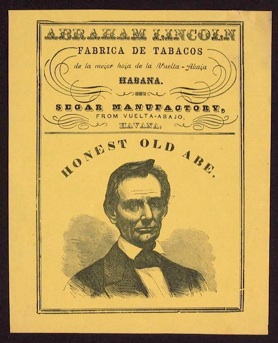
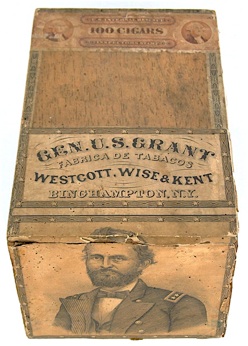
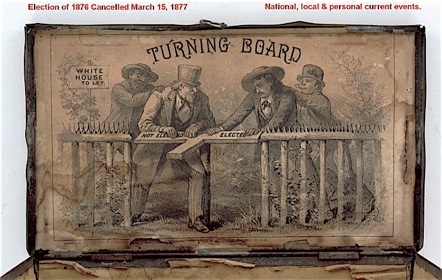

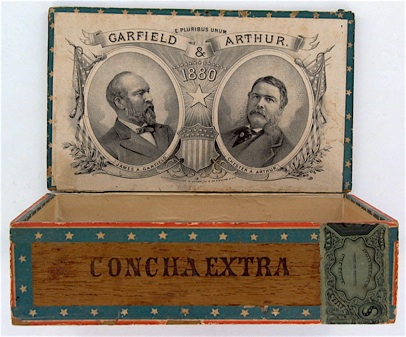
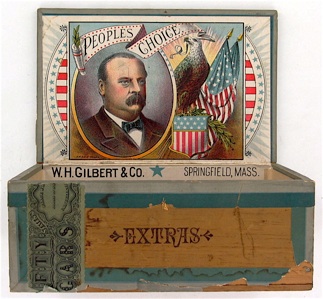
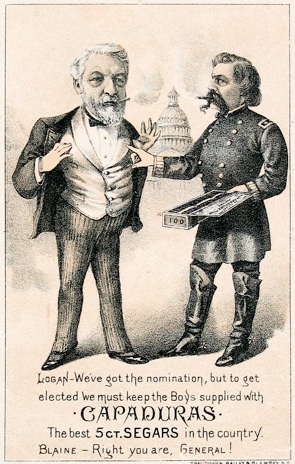
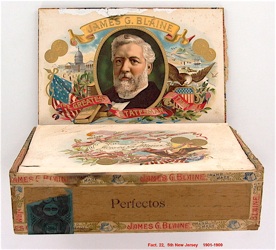
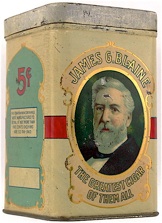
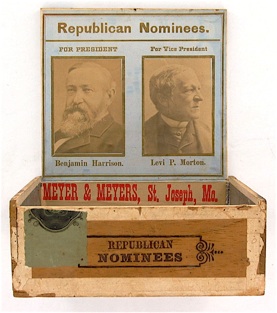
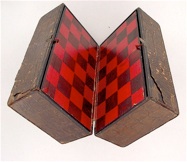
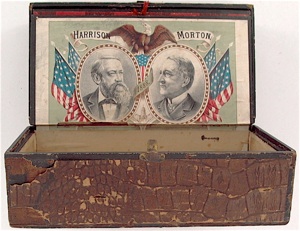
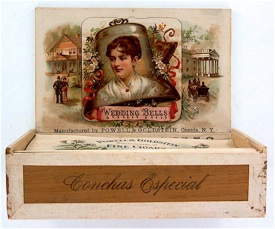
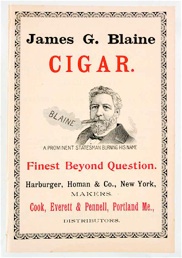
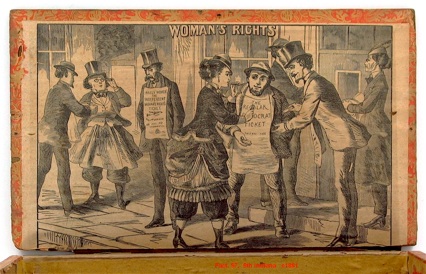
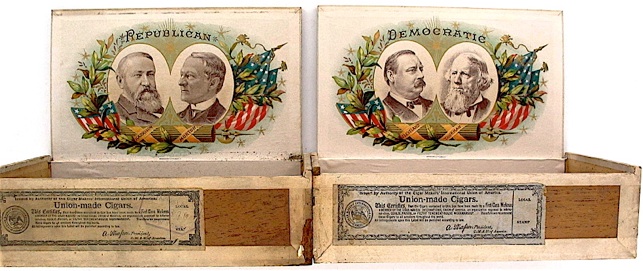
Unusual political box made in Fact. 14, 1st Ohio.
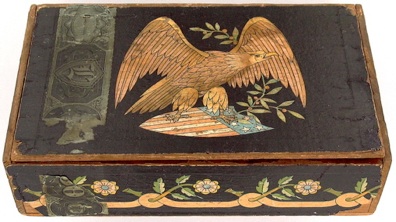

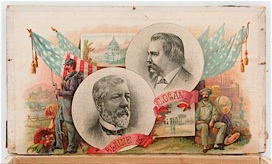
This may be the first Lincoln label, but certainly not the last. Lincoln has appeared on more cigar labels than any other person, more than 1,000 different.
Introduced in the late 1870’s, this style NWH choice box held two standard cabinet photos of politicians or other celebrities. [2169]
REPUBLICAN NOMINEES has real photos pasted on, five years before it became technologically possible to print photos on a label. The box may be one of a pair. [2163] Introduced in the late 1870’s, this style NWH choice box held two standard cabinet photos of politicians or other celebrities. [2169]
REPUBLICAN NOMINEES appears to have real photos pasted on, five years before it became technologically possible to print photos on a label. The box may be one of a pair. [2163]
best seller, face-out toward the customer. [8168]
Pairs, like seen
below, are rarely
found. [2171]
1888 & 1892 Free Trade vrs. Protectionism
This little gem is a box of 5 cigars given away as a thank you to Republican donors. To speed production and keep costs down, they used a standard “Nailed Wood with Hardware” but the black and silver logo and use of silver ink are both distinctive. It is the oldest box of 5 yet reported as that size box wasn’t legal until 1910. This would have been packed with 9 or 19 or 39 others in a larger box (likely cardboard) to which a 50 or 100 or 200 tax stamp could be attached. [9285] [3595]
A large “McKinley Stinker” poster criticizes the McKinley tariff act of 1891 which sent the price of Cuban cigars and Cuban tobacco skyrocketing, thus driving down the quality of domestic cigars dependent on the latter for blending. The tariff was but one of the reasons the Republicans lost the election of 1892.
[11603]
1892 Benjamin Harrison vrs. Grover Cleveland (Round II)
In 1888 the Democrats won the popular vote by 90,000 out of 11,000,000 cast, but decidedly lost the electoral college. Cleveland continued the long tradition of Presidential candidates not personally campaigning, by giving only one speech in 1888 (wouldn’t THAT be refreshing today?) leaving all the campaigning to Allen Thurman, his 77 year old VP running mate. Last minute Republican trickery using a fake letter allegedly from British officials urging support of Cleveland swayed the huge NYC Irish vote, costing the Democrats NY and the election.
In 1892 the same candidates, both with new running mates, went at it again. Incumbent Harrison faced serious opposition for the nomination from James G. Blaine and William McKinley. Populists, Prohibitionists and Socialists all ran presidential candidates. With free trade the key issue, labor backed the Democrats. 74.7% of the country’s eligible voters cast ballots, and Cleveland became the first, and still only, man to serve non-consecutive terms as President.
According to the back of this trade card for BREVITO cigars, the U.S. was very different in 1892. States with the same or more electoral votes than California: Alabama, Georgia, North & South Carolina, Mississippi, Tennessee, Kentucky, Virginia, Missouri, Michigan, Ohio, Minnesota, Illinois, Indiana, Texas, Wisconsin, Iowa, Massachusetts, Kansas, New Jersey, New York and Pennsylvania. Louisiana, Maryland, Arkansas and Nebraska had only one vote less, The West Coast was nearly empty. [11679]
This give-away box of 12 was legalized in 1891, the year before the election. Printing on wood was considerably cheaper than paper labels. [2189]
The back of this Harrison card proclaims both candidates have “pronounced in favor of the excellent quality of the PAPPOOSE cigar.” I wonder. [8661]
1896 William McKinley vrs. William Jennings Bryan
McKinley and his VP, Garret Hobart, on a
box of cigars by S. Florey, Beloit, Wisconsin.
The election was basically a single issue: would America remain on the gold standard or would the economy switch to silver, a theory espoused by Bryan and the Populists who argued that backing currency with silver would put more money in circulation, helping poor Southern and Western farmers and pull the country out of the Depression of 1893. To combat McKinley outspending him 10 to 1, Bryan became the first Presidential candidate to stump the country giving talks off the back of railroad cars. The Republicans sent paid goons to follow Bryan denouncing him as a radical every-where he spoke. Huge expenditures and active candidate campaigning lead some to call this the first modern Presidential election. [11630]
1900 William McKinley vrs. William Jennings Bryan (Round II)
Recovery from the hard times of the early 90’s and the decisive victory in the Spanish-American war (in which his VP candidate played a noisy role) helped McKinley score a decisive victory. While McKinley followed the practice of a century of predecessors and “front-porched” it, Roosevelt and Bryan logged more than 20,000 rail miles each, Teddy basking in the righteousness of the War and calling for “Four more years of the full dinner pail.” Bryan advocated freeing the newly won territories, while Roosevelt argued “we have to civilize them first.” Prosperity carried the day.
McKinley’s assassination, the third president to be shot in office, soon put Roosevelt in charge.
OUR CANDIDATES exemplifies the new Ben Day printing technology which allowed cigar labels to be printed with photographs. Cigars by Barlow, Rogers & Simpson, Binghamton, NY. [7932]
Black labeled and edged box issued upon the shooting death of McKinley. [2689]
Pair of stock labels integrating Ben Day photos was offered by NYC printer Schmidt & Co. The technique was named after its inventor, Ben Day.
A bloated Uncle Sam after taking over Cuba, Puerto Rico and The Philippines, all in need of “civilizing” according to Republicans. [2119]
1904 Theodore Roosevelt vrs. Alton Parker
A Your Choice depicting rival Presidential hopefuls. The divider, originally in the middle of the box, has been moved so there were 45 cigars on T.R.’s side and 5 on Parker’s, a commentary on his chances? [11602]
The election of 1904 is second only to that of 1888 in the number of cigar boxes it generated, surprising since T.R. was so popular that Democrats hesitated to run against him. Bryan sat this one out. Cleveland refused to come out of retirement. Only publisher William Randolph Hearst wanted the nomination, but the Dems didn’t want him, selecting a little known NY judge, Alton Parker, to head the ticket. For VP they chose 81 year old millionaire Henry Davis of West Virginia, in hopes he’d pick up the tab for a sure-to-be losing effort. He didn’t. The man his own party called “that damned cowboy” won easily, while supporting conservation, national parks, the Panama Canal and the elimination of the trusts.
The oddly configured double-50 box was a bit more practical than the center hinged game box used in i878, but still not as useful as it would have been with the dual lids side by side. [2167] [2168]
1908 William Howard Taft vrs. William Jennings Bryan
The Museum
does not own
a box from
this election
Roosevelt personally urged the Republican party to pick Taft as their standard bearer. The Democrats, so badly creamed in 1904 with conservative Parker ran ultra-liberal Populist Bryan who vigorously campaigned against big business and the trusts. Roosevelt’s strong record of progressive reforms brought a lot of new voters to the Republican party and Taft won handily, sending Bryan to a crushing defeat.
This unusual box offering 25 novelty 10” cigars as a “Souvenir of our great President” was a visual pun on 300+ pound Taft. [P0640]
1912 Woodrow Wilson vrs. Teddy Roosevelt vrs. William Howard Taft
Popular speaker of the House “Champ” Clark competed against Wilson for the Democratic nomination, narrowly losing on the 46th ballot. Wilson won the nomination and the election, becoming only the second Democrat to live in the White House between 1856 and 1932. Roosevelt, unable to secure Republican party support founded the Bull Moose Party and became the last 3rd Party candidate to come in second in a Presidential vote.
Champ Clark, whose real name was James Beauchamp Clark, lost the nomination, but won the cigar wars. Boxes with his not-so-flattering portrait are found more often than those picturing Wilson, Taft or males of the moose persuasion.
Cardboard slide box of 10 decorated for the Christmas trade at National Cigar’s retail chain stores. Cigars by Penn Cigar Co., Reading, PA.
[3577]
Considering Roosevelt’s popularity with the working class, it’s a surprise that more boxes aren’t found supporting his candidacy. Though not named, it’s clear who this 1912 box favored. [11722]
1916 Woodrow Wilson vrs. Charles Evans Hughes
Believing Wilson vulnerable, a goodly number of Republicans fought to be their party’s nominee.
Ultimately the Presidential campaign was focussed on the war in Europe. Wilson didn’t like the slogan used by many of his supporters, “He kept us out of war” but benefitted from widespread rumors that Hughes was secretly planning to embroil us in Europe. Hughes, the only Supreme Court Chief Justice to ever run for the Presidency, accidentally slighted Hiram Johnson, the power-brokering governor of California, and lost his support. Hughes ultimately lost California by 4,000 votes out of 1,000,000 cast. Had Hughes won California, he would have been President.
1920 Warren G. Harding vrs. James Cox
Stock FM Howell label and standard Harding portrait make an uninspiring combination. Post WWI political boxes are scarce. [7937]
The election was dominated by the aftermath of WWI and hostility to Democratic incumbent Wilson. Politicians argued over peace treaties and whether America should enter the League of Nations. The year 1919 had been marked by major strikes, race riots, terrorist attacks, and an economy in recession. Both the Irish Catholic and German communities hated Wilson’s politics.
Both candidates, Governor James Cox and Senator Warren Harding, were unknowns from Ohio. Harding basically campaigned against Wilson, outspent Cox 4 to 1, and won with the largest popular vote margin in history.
Harding’s administration was marred by scandal when his Secretary of the Interior was caught taking $400,000 in bribes to lease Federal oil reserves in
California and Wyoming to private companies.
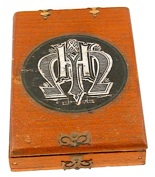
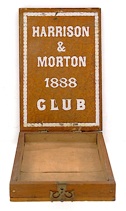


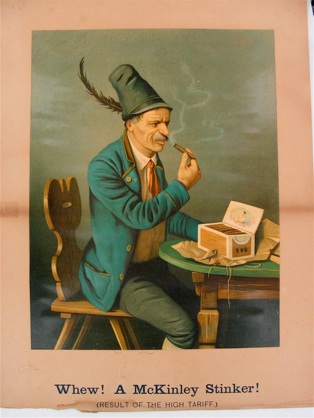
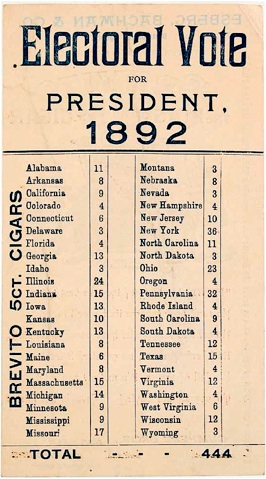
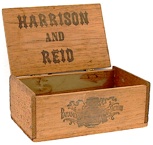
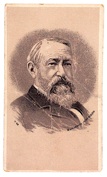
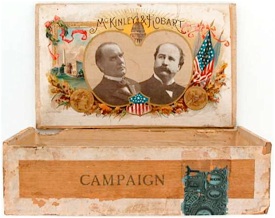
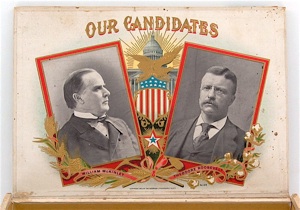
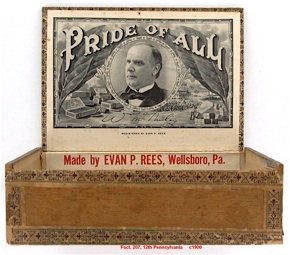
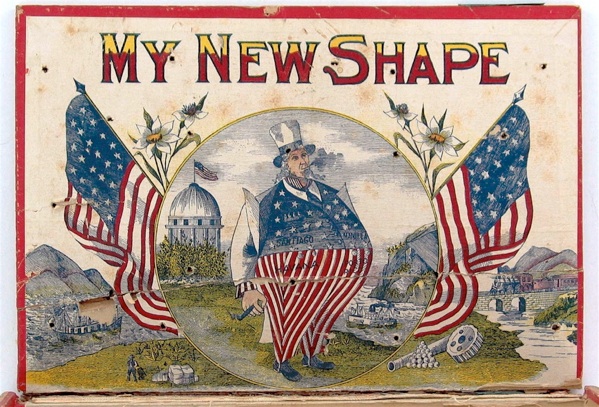
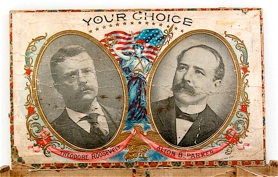
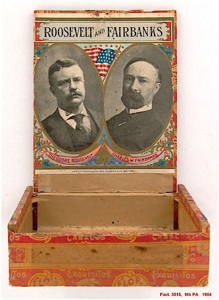
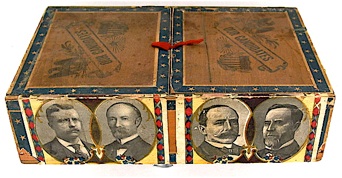
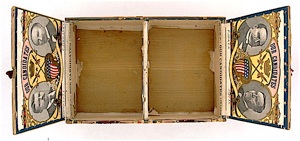
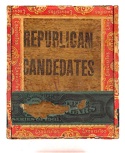
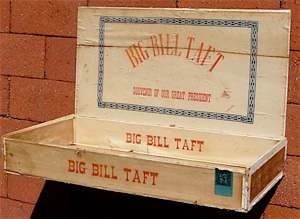
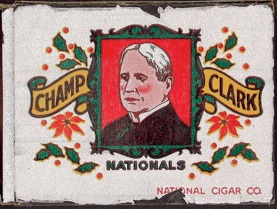
1924 Calvin Coolidge vrs. John Davis vrs. Bob LaFollette
LaFollette won the cigar war, as I’ve yet to find a Coolidge or Davis box, but have seen four different LaFollettes, including this one issued 19 years after his death. Cigars made in Wisconsin, where else? [2172]
Many Democrats thought their party’s candidate was too conservative, causing a rift which ultimately led to the nomination of the populist Republican Senator from Wisconsin, Robert “Fighting Bob” LaFollette, as the Progressive Party nominee. LaFollette, a former Representative and Governor, was making headlines as leader of the investigation of the Teapot Dome oil lease scandal. LaFollette won 17% of the popular vote, ensuring “Keep cool with Coolidge” would carry the day with a campaign based on prosperity and no visible international squabbles.
Despite losing his Presidential bid, based on his accomplishments in office (1906-1925), LaFollette tied with Henry Clay as the “greatest Senator in U.S. history” in a 1982 poll of political historians.
1928 Herbert Hoover vrs. Al Smith
Once again, the loser of the election wins the cigar wars. AL SMITH remained a popular seller in New York as long as Mulford & Son made cigars.
During Smith’s campaign, the biggest seller was “President Size.” [7940]
As Secretary of Commerce under both Harding and Coolidge, Hoover was identified with a booming economy. As the first Catholic to run for the Presidency Smith met fierce anti-Catholic sentiment, not helped by his stand against still-popular prohibition. Smith wasn’t helped by the fact that his party-picked conservative VP and he were at odds on both Religion and temperance. Smith also was hurt by reaction against the corruption of the Democrat’s political machine, popularly called “Tammany Hall,” while, at the same time, the Teapot Dome investigation and scandal didn’t catch the public’s imagination enough to have much impact on the Republicans. Hoover won in a landslide.
The use of movie shorts, newsreels, and radio spots mark this as the first media-driven campaign.
1932 Franklin D. Roosevelt vrs. Herbert Hoover
Hoover was blamed for the Depression which hit in 1929. His cabinet consisted of wealthy conserva-tives who were viewed as doing nothing to stop it from getting worse every day, while Hoover kept insisting it was over. Homeless communities of tents and make-shift shacks were called “Hoover-villes.” Roosevelt promised a “New Deal” for America. In the election, Communists, Socialists and Prohibitionists all got significant votes.
Only Lincoln, Washington and Teddy Roosevelt generated more brands of cigars than F.D.R. This 1932 box was made by Blackmore Cigar Co. in Syracuse, NY, and is based on the same F.M. Howell stock label as the Harding box (above). [7946]
1936 Franklin D. Roosevelt vrs. Alf Landon
After 4 years in office, gone is the cheerful visage of his earlier box. Considering his association with the working class, it’s seems odd this would be a 10¢ cigar at a time when less than 10% of all cigars in America sold for more than a nickel. [7942]
Roosevelt’s Social Security and unemployment benefits were so wildly popular he carried 46 of 48 states. The election is famous for two polls, the first by Literary Digest who mailed 10,000,000 questionnaires, and predicted Landon would win 57% to 43%. The second poll was conducted by George Gallup, an ad exec, who sent out a mere 5,000 but correctly predicted that the Digest poll would be wrong and that FDR would win. The problem with the Digest poll was they polled using easily available lists of people who owned phones and automobiles, both luxuries of the wealthy during the Depression; Gallup’s much smaller sample was carefully selected to represent a cross section of the voting population. The era of modern polling was begun.
1940 Franklin D. Roosevelt vrs. Wendell Wilkie
Roosevelt’s landmark decision to run for an unheard of third term was a major issue, as was the possibility of American involvement in the war in Europe. The Nazi menace convinced Roosevelt that he was the only one prepared to deal with it, and the only candidate capable of beating the charismatic speaking Wilkie. Roosevelt won with a coalition of labor unions, big city machines, ethnic voters and the Democratic South.
These 8” foil-covered smokes appeared big and fancy but sold for only a nickel according to the tax class notice. The monochrome label and absence of trim other than edging offset the cost of foil. [6933]
Two almost identical “your choice” boxes, one showing both candidates. Since the box is without a divider, unless the cigars themselves were marked or banded, it’s not offering a real choice. Cigars are priced at 5¢.
The second calls Willkie “Your Choice for President,”
giving it a very different meaning just by removing one
portrait. Willkie cigars are priced at 2/5¢.
Both were made by
J. Arthur Doll Cigar
Co. The “your choice”
box on the left was
made in his Yorkana,
PA, factory, while the
Wilkie is from his
Mount Wolf factory.
[7949] [7950]
The book shaped box names the 1936 Philadelphia convention but how they were sold or given away is unknown. Cigars by Service Cigar Co., Fact. 481 in Philadelphia. [3308]
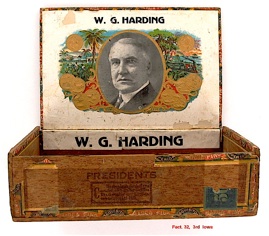
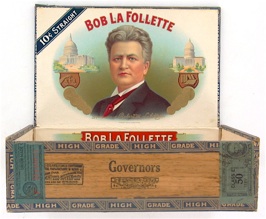
1922 The Scandal of the Decade
Wonderful play on words. Crooks are a type of cigar with a rectangular cross-section that are moulded in such a way as to put s-bend in the middle. The Capitol dome and oil derricks complete the pun. [2547]
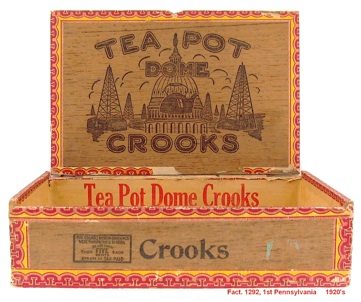
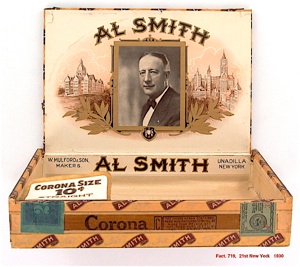
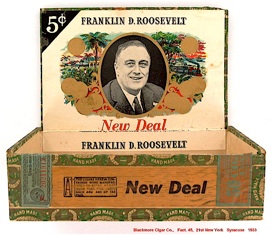
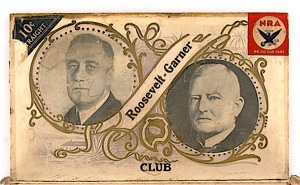
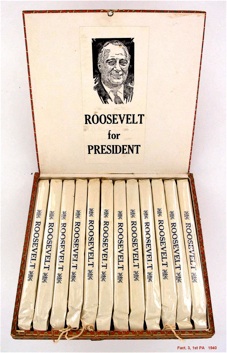
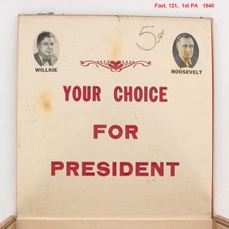
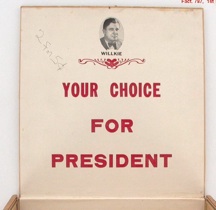
1944 Franklin D. Roosevelt vrs. Thomas E. Dewey
Large 8” to 12” novelty cigars for candidates have been around since the early 1900’s. This jumbo is not in the NCM collection, but pictured because I have no other cigar item from this election.
1948 Harry Truman vrs. Thomas Dewey
Workman takes a cigar break while setting up one of the halls for the Republican convention of 1948. The number of ashtrays suggests the smoke-filled room of legend was still around. Unfortunately for cigar makers, the movies and WWII combined to continue the trend of cigarette smoking. Not in the NCM.
The modern speech was born!
Republican conventioneers had adopted a progressive platform that included increased social security, public housing, civil rights, and Federal support of education and health, none of which was supported by the Republicans in Congress, whom Truman called “the do-nothing Congress,” challenging them to make the party’s platform happen. “Give ‘em Hell, Harry,” became a popular catch phrase. Once again, pollsters called the election wrong, the result of bad sample selection.
After World War Two: the Bubble Gum Revolution
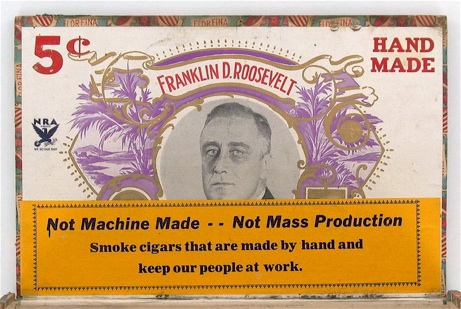
Another smiling confident portrait, the favorite used in the 1932 campaign. “Beware of imitations” referred to other makers selling cigars under the same brand name, but could also have political overtones as well.
Originated by the State Cigar Co. of Milwaukee, but not necessarily made by them. Factory number scratched out on the bottom.
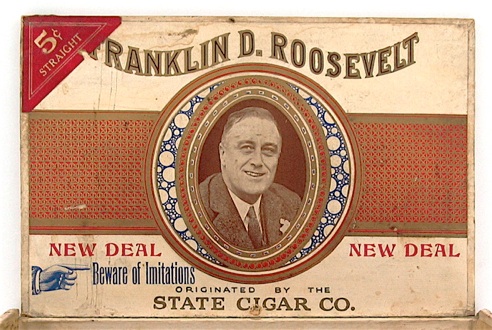

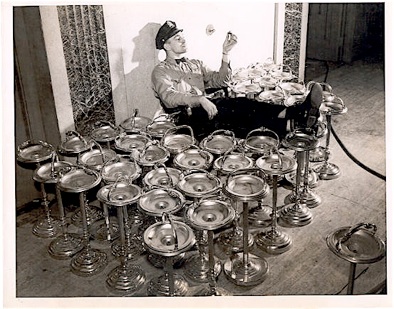
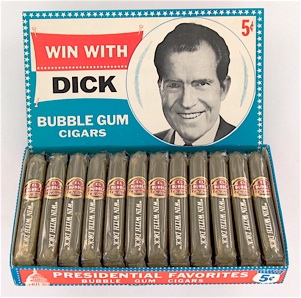
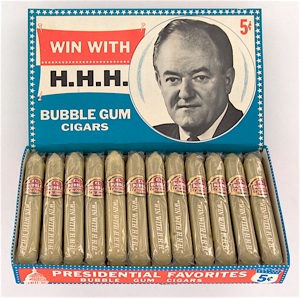
We have to wonder whether whether that gracious custom will be revived any time soon. President Obama is a cigarette smoker, but hides the fact, never smoking in public. But, someday cigars will re-enter the home of our nation’s leader. Although a woman will undoubtedly take over the country eventually, the reality of American political life is that, with a few exceptions, most Presidents are smart, wealthy and male, qualities shared by the majority of cigar devotees.
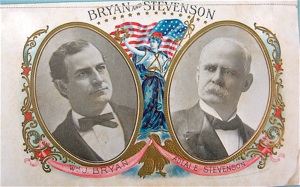
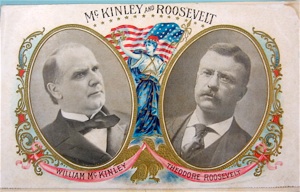
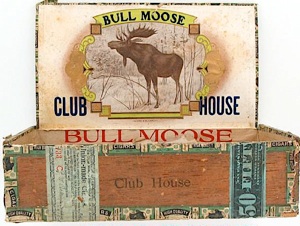
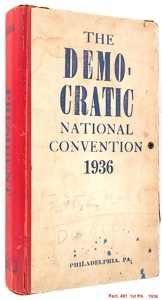
The world of political boxes hasn’t ended
I don’t know the story behind it, or how or where it was sold, but this nice 10.25” x 7.25” varnished semi-boite nature box of 12 clearly honors the Republican Convention held in New York City August 30 to September 2, 2004.
Cigars made by LA ROMANA in the Dominican Republic.
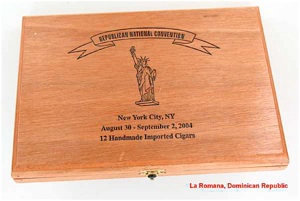
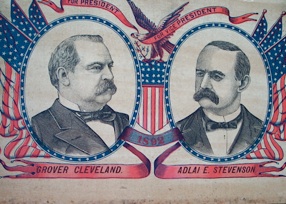
Cigars were packed in an attractive flag-covered box of 50 by Factory 1848, 9th Dist. PA for the Enterprise Cigar Company to cash in on the election.
1956 Convention
Cigar band from Jumbo “cigars” sold in typical boxes of eight in Chicago during the convention.
For more on Jumbo boxes go here.
[12903]


Every election since 1952 has featured classic “Your Choice” cigars, matched pairs atop a counter.
Alas, rather than the mellow Havana blends of yore, the choices of today are bubble gum, a reflection some would claim, on the quality of campaigns and campaigners themselves. [7955] [7954]


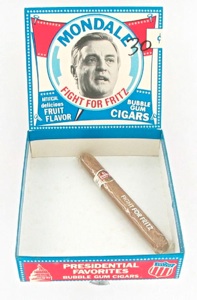


Bush: [18304]
Dukakis: [18303]
Mondale [18305]
Lid for all above: [18302]
McGovern: [18306]
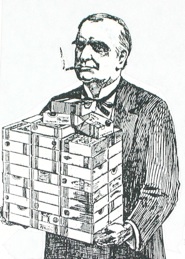
McKinley reportedly smoked 18 cigars a day. A DC tobacconist bragged McKinley had consumed 100,000 of his brand of cigars.

Roosevelt’s NRA was already victim of a Supreme Court ruling when this 1933 label was used in 1936. Ted Scott was either a die-hard true believer or simply using up old labels.
Fact. C-46, 8th Dist.
Peoria, Illinois.
“Your choice” style boxes were popular in the last quarter of the 1800s. OUR CANDIDATES boxes are frequently found missing the cabinet photos originally inserted in the slot visible at the end of Harrison’s lid. This box design, with names like OUR FAVORITES or OUR CELEBRITIES, was also used for popularity contests featuring photos of entertainers. [16605]
Box obtained courtesy of Joel & Suzanne Flegal.